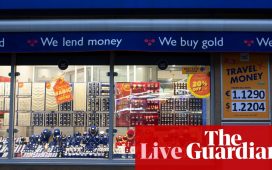
© Reuters. A truck is checked after disembarking from the P&O Ferry from Cairnryan in Larne, Northern Ireland February 27, 2023. REUTERS/Lorraine O’Sullivan
2/4
LONDON (Reuters) – Britain and the European Union announced a new deal for post-Brexit trading arrangements for Northern Ireland on Monday in a bid to end a row that has overshadowed their ties since Brexit.
The deal seeks to resolve the tensions caused by the Northern Ireland protocol, a complex agreement which set the trading rules for the British-ruled region that London agreed before it left the EU but now says are unworkable.
Below are the key parts of the new framework outlined by Prime Minister Rishi Sunak and European Commission President Ursula von der Leyen at a news conference:
CUSTOMS
When Britain left the EU, then Prime Minister Boris Johnson agreed to a deal that effectively left Northern Ireland in the bloc’s single market for goods because of its open border with EU member Ireland, creating a customs border with mainland Britain.
The British government has wanted to reduce the number of checks on goods travelling from Britain to Northern Ireland.
The two sides have agreed to separate goods just going to Northern Ireland and those which will continue into the EU into “green” and “red” lanes.
This is designed to reduce the paperwork facing companies that have said they were unable to provide a full range of products to Northern Ireland because the number of checks were too onerous.
“It means food retailers like supermarkets, restaurants and wholesalers will no longer need hundreds of certificates for every lorry,” Sunak said. “And we will end the situation where food made to UK rules could not be sent to and sold in Northern Ireland.”
EU LAWS
Under the earlier deal agreed with the EU, Northern Ireland followed some of the bloc’s laws so that goods flow freely over the border with Ireland without checks.
Sunak said the Northern Ireland Assembly will now be able to “pull an emergency brake” on any changes to EU rules and the UK government will “have a veto”.
Von der Leyen said said Britain and the EU would consult each other extensively when introducing new laws and regulatory changes in an effort to reduce the need for using the brake.
But in comments that may contradict that statement, von der Leyen said that the European Court of Justice (ECJ) will remain the ultimate arbiter of whether Northern Ireland is following single market rules.
“The ECJ will have the final say on EU law and single market issues,” she said.
VALUE ADDED TAX
Businesses in Northern Ireland currently follow EU rules on value-added tax (VAT). This means tax breaks by British government payments to help firms in Northern Ireland must be compliant with rules set by the EU.
Under the new deal, the British government will have freedom to set VAT in the province.
“We’ve amended the legal text of the Protocol to ensure we can make critical VAT and excise changes for the whole of the UK for example on alcohol duty, meaning our reforms to cut the cost of a pint in the pub will now apply in Northern Ireland,” he said.
HORIZON
Under a trade agreement signed at the end of 2020, Britain negotiated access to a range of science and innovation programmes including Horizon, a 95.5 billion euro programme that offers grants and projects to researchers.
But 18 months on, Britain says the EU has yet to finalise access to Horizon, Copernicus, the earth observation programme on climate change, Euratom, the nuclear research programme, and to services such as Space Surveillance and Tracking.
Von der leyen said once the new deal is implemented work would begin on restarting Britain’s cooperation with Horizon.
“This is good news for all those who are working in research and science,” she said.








